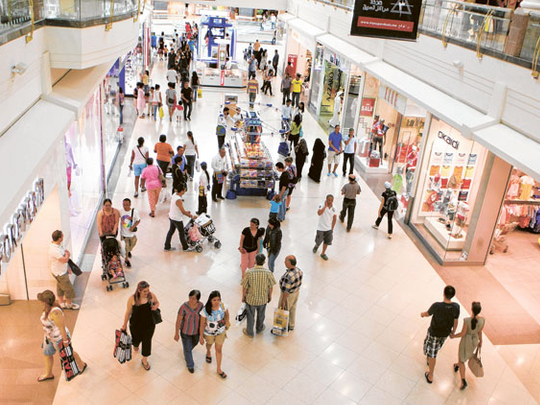
Dubai: If you thought Dubai had all the retail brands and then some to keep a shopper busy all-year round, you would be right. So much so, the emirate now enjoys the same bragging rights as London in being the "most popular retail city in the world", according to a new report issued by CB Richard Ellis, the real estate consultancy.
More than half of all international retail brands polled by CBRE in its report — ‘How Global is the Business of Retail?' — were already represented in Dubai, and the process was accentuated by the entry of many US brands over the last 18 months. This was brought about by the opening of Mirdiff City Centre. Earlier, the Dubai Mall also brought in new brands
The entry of US brands in force also represents a major redrawing of the retail landscape here. According to CBRE, US retailers have historically shied away from adopting the retail franchise model that is prevalent in the Middle East.
"However, with limited opportunities for growth in their own markets, more retailers have taken the plunge and made inroads into the region, typically using Dubai as a springboard into the region's other markets," said the CBRE report.
More could be waiting in the wings, and not just from the US. Dubai was the top target for Asian retailers targeting markets outside their home region (22.9 per cent) and second only to London as the top destination for US retailers, with 62.7 per cent of those surveyed present.
"Notably, these are the only two cities [outside of Asia] where more than 10 per cent of Asian retailers have a presence, which reflects the fact that most Asian retailers have yet to leave their own region."
According to market sources, there are any number of brands out there that could yet find a receptive shopper in this region.
"Retail franchising has always been a hit-and-miss game and these days the chances of scoring misses that much are more," said an industry analyst. "It also explains why in recent months there have been quite a few changes in franchise arrangements as international brands shift allegiances.
"They want to go with a partner who is willing to invest in a standalone store in a leading mall rather than a corner in a multi-brand outlet. The market will see more such shifts in the future."
According to Ajai Dayal, a senior retail industry insider, new and untested brands can still play a part in the local market provided they come with the right credentials.
"Acceptance will depend on the nature of the brand itself and, to a good extent, on whether they represent hot property in their own domestic markets," he said.
"For instance, brands such as Uniqlo and Primark are hugely popular in the UK and could easily fit in here.
Key strategy
"And it was just last year a leading American label was introduced here despite many doubting whether it would make an impact. But it did and in the mid-priced range there's always space for more."
Dubai's leap to joint number one standing in the global retail destinations' hierarchy ties in neatly with international brands — particularly those of European and US origin — seeking to expand.
"International expansion remains a key strategy for retailers throughout the world, with 40 per cent of new openings occurring outside the retailer's home region," said the CBRE report.
Dubai and London were followed by New York, Paris and Hong Kong as favoured destinations for brands. The composition of the rest of the Top 20 is a mix of traditional and emerging markets, and "providing an indication of how global the international retail business really is", the CBRE report indicated.
"Even though the pace of expansion has slowed, with the overall footprint increasing by two per cent compared with four per cent in 2009 and 12 per cent in 2008, some 21 countries saw five or more new retailer entrants last year."
"Although the pace of growth slowed in 2010, retailers continue to grow their store networks in a wide range of international markets," said Peter Gold, head of EMEA cross-border retail at CBRE.
But "two factors will limit the rate at which retailers expand in coming years. A a limited pipeline of new space in many markets will restrict access to prime retail locations, and as a result, more retailers may look to grow their business via online platforms rather than expanding their physical store network."
Dubai's retail pull — and the many mall-led retail developments happening in Abu Dhabi — propelled the UAE to be the second most "highly penetrated global market" after the UK. The UAE accounted for 54 per cent of all international retail brands surveyed, while the UK maintained its edge for the fourth year running with 58 per cent.
Long-term impact
The US came in third (with 50 per cent), while other GCC markets were well-represented in the 2010 findings with Saudi Arabia in 11th spot, Kuwait at 14th, Bahrain in 29th and the 30th for Qatar.
"Retailers are looking to replicate their success in other Middle Eastern countries with a similar consumer base," said Michael Leighton, senior retail consultant at CBRE's regional operations.
"Essentially this means a wealthy, well educated, and well travelled population with a high propensity to use modern shopping malls.
"Kuwait and Saudi Arabia fit the bill, as does Abu Dhabi where two new shopping centre openings is likely to make it a bigger destination for new entrants than Dubai next year. The recent unrest in the Middle East cannot be ignored, but it is unlikely that this will have any long-term impact on retailers' desires to expand into the region."
Emerging markets to steal spotlight
If 2009 saw a flood of new retail brands trying to win over Middle East shoppers, the trend hit a speed bump last year. New store openings in the UAE dropped slightly.
"However, this is relative to the high proportion of retailers already present in Dubai and retailers remain active in the region, with Kuwait (six new entrants) and Saudi Arabia (five) proving popular," said the CB Richard Ellis report.
"Retailers are increasingly looking at markets where GDP has held up relatively well and where consumer spending is unlikely to be squeezed by austerity measures that have mostly affected Western European and North American consumers," said Peter Gold of CBRE.
"Retailers from more mature markets are looking to emerging markets for new growth, as the scope to expand and generate strong returns in their domestic markets diminishes."












